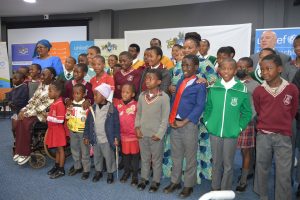By Ncaba Ntshakala
Eswatini’s consistent allocation of over 5% of its GDP towards education has been hailed as a significant investment in the nation’s future by UNICEF’s Deputy Representative, Afshin Parsi.
Parsi shared these insights during the commemoration of the Day of the African Child at the UN House last Thursday, where he also emphasized the positive impact that this expenditure has on the country’s development.
During his remarks, Parsi welcomed attendees warmly. “This might be our house, but it’s your home.
The United Nations Charter starts with ‘We the people,’ so thank you for joining us,” he stated, setting a collaborative tone for the event.
ALSO READ: Minister Owen highlights importance of…
Eswatini’s dedication to education is evident in its consistent investment, which has averaged over 5% of the GDP in recent years.
Parsi praised this commitment but posed an important question; “If the investment is good, are we getting the return? One factor hindering optimal investment is the high repetition rate in our education system.
By improving education quality, we can reduce repetition and reinvest savings into further improvements.”
Parsi further reflected on the historical significance of the Day of the African Child and recounted his visit to the Soweto memorial, where he highlighted the unique nature of the Soweto Uprising.

“Most uprisings are for freedom, better living conditions, or independence. The Soweto Uprising was for quality education, which guarantees a future.
Nearly five decades later, we must ask ourselves if we are providing the education those children fought for.
He pointed to alarming regional data, indicating that nine out of ten children in southern and eastern Africa, by grade two or three, cannot read and understand a simple paragraph.
Fortunately, Eswatini’s situation is slightly better, but Parsi stressed the need for continuous improvement. “Are we providing the quality education that our children deserve? Is it inclusive, free, and accessible to all?” he questioned.

He also highlighted Eswatini’s noble aspiration of becoming a first-world country, where he expressed the crucial role of education in achieving sustained economic growth.
“The more years of effective education you provide, the higher your GDP. Investing in education is key to closing the gap with developed countries,” he said.
ALSO READ: MTN Bushfire, UN ignite youth…
He acknowledged the significant efforts made by the Ministry of Education, particularly in the wake of Covid-19, and the recent education reform plan endorsed by the cabinet.
However, Parsi echoed the Deputy Prime Minister’s call for even greater action. “The Ministry of Education has made tremendous efforts, but more needs to be done,” he said.
Moreover, Parsi expressed gratitude for the collaborative efforts of various partners in commemorating the Day of the African Child.
“This event and the activities throughout the month are the result of a large number of partners working together. UNICEF is here to support the government in improving education quality,” he assured.